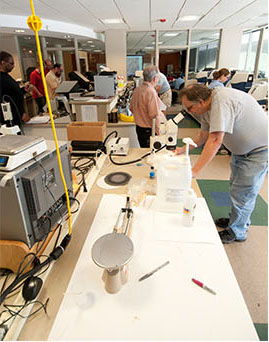Course Details
Your Growth, Our Mission

Course Description
The Training Course Will Highlight ?
Upon successful completion of this course, participants will be able to:
-
- Appreciate the meanings of different technical terms and concepts used in engineering metallurgy
- Understand the difference between metals and alloys and the need for alloying
- Be able to choose the appropriate material for a certain application
- Carry out mechanical testing
- Choose the right metallographic examination for a specific microstructural examination.
- Relate type of material and microstructure to chemical composition and thermal and mechanical (thermo-mechanical) history of the material.
- Relate different mechanical properties to material’s microstructure and thermo-mechanical history.
Training Objective
Upon successful completion of this course, participants will be able to:
-
- Appreciate the meanings of different technical terms and concepts used in engineering metallurgy
- Understand the difference between metals and alloys and the need for alloying
- Be able to choose the appropriate material for a certain application
- Carry out mechanical testing
- Choose the right metallographic examination for a specific microstructural examination.
- Relate type of material and microstructure to chemical composition and thermal and mechanical (thermo-mechanical) history of the material.
- Relate different mechanical properties to material’s microstructure and thermo-mechanical history.
Target Audience
Design engineers, process engineers, manufacturing engineers, product development engineers and managers, mechanical engineers with or without experience in metallurgy, Inspection people, quality control engineers and technicians and people involved in welding, fabrication and heat treatment.
Training Methods
Training will be delivered mainly through lectures with emphasis on practical examples and case studies. Practical sessions would be provided when and wherever possible.
Daily Agenda
Structure of metals and alloys
-
- Nature of metallic bonding
- Crystal structure of metals
- Structure of alloys
- Imperfections in crystals
- Experimental study of structure
Formation of alloys
Major requirements for alloying
Main types of phases present in metallic alloys and their formation
Strengthening mechanisms in alloys
Thermal equilibrium diagrams (Phase diagrams)
-
- The phase rule
- Binary Equilibrium diagrams
- Microstructural changes during cooling
- Ternary equilibrium diagrams
Introduction to ferrous metallurgy (steel and iron)
-
- Introduction to Fe-C phase diagram
- Introduction to Carbon steels
- Introduction to cast irons
- Basic heat treatment and hardening of steels
Strength of Materials
-
- Definitions and technical terms used in strength of materials
- Strengthening mechanisms in metals and alloys
- Tensile strength
- Impact strength and shock resistance
- Fatigue Strength
- Fracture strength
- Wear resistance
- Hardness
- Strength-Deformation relationships
- Ductile and brittle materials
Mechanical properties and mechanical testing
-
- The tensile test
- Stress – Strain curves
- Fatigue life and fatigue testing
- Hardness testing
- Creep resistance and creep testing
- Wear testing
- Impact testing
- Plastic deformation mechanisms
- Fracture of materials
Practical metallography
Metallurgical principles of the joining of metals
introduction to metallurgical failure analysis
Accreditation
BTS attendance certificate will be issued to all attendees completing minimum of 80% of the total course duration
Quick Enquiry
Request Info
Related Courses
Your Growth, Our Mission

